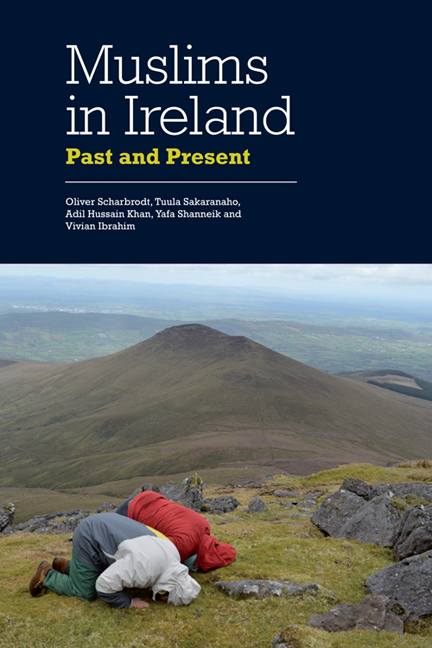Book contents
- Frontmatter
- Contents
- Figures
- Acknowledgements
- Introduction
- I History of Muslim Presence and Immigration to Ireland
- II Mosques, Organisations and Leadership
- III The Governance of Islam in the Republic of Ireland: Freedom of Religion and Islamic Education
- 6 Religious Freedom and Muslims in Ireland
- 7 Education and Muslim National Schools in Ireland
- IV Diaspora and Identity
- Conclusion: Being Irish, Being Muslim
- Bibliography
- Index
6 - Religious Freedom and Muslims in Ireland
from III - The Governance of Islam in the Republic of Ireland: Freedom of Religion and Islamic Education
Published online by Cambridge University Press: 05 August 2016
- Frontmatter
- Contents
- Figures
- Acknowledgements
- Introduction
- I History of Muslim Presence and Immigration to Ireland
- II Mosques, Organisations and Leadership
- III The Governance of Islam in the Republic of Ireland: Freedom of Religion and Islamic Education
- 6 Religious Freedom and Muslims in Ireland
- 7 Education and Muslim National Schools in Ireland
- IV Diaspora and Identity
- Conclusion: Being Irish, Being Muslim
- Bibliography
- Index
Summary
Introduction: Muslims and Respect for Religion in Ireland
Until recently, religion constituted a pervasive force in Irish society. Owing to the strong influence of Catholicism on people's everyday lives, Ireland has been perceived as ‘a particularly religious country’, and the Irish people somehow as being ‘naturally religious’. During recent decades, however, the religious adherence of Irish people has been in constant decline, Irish society has experienced drastic social and economic changes, and the impact of the Catholic Church on Irish society and jurisprudence has weakened. All these changes notwithstanding, it has been argued that religious discourse still has a role to play in the public sphere in Ireland and most probably will continue to do so, even if heavily contested.
The Catholic legacy of public religion in Ireland is very much in accordance with the needs of Muslims who aim at establishing Islam in the country. The ‘religious sensitivity’ and ‘respect paid to religion’ in Ireland have been greeted with enthusiasm by leaders of Muslim communities, who compare Ireland to countries such as Britain with a more ‘secular atmosphere’. One can often hear some Muslim leaders in Ireland say that Ireland is friendlier, more religious and more respectful of others than Britain. It is also emphasised that the Irish in general and the representatives of the Catholic Church in particular are willing to listen to the members of other religions.
That Muslims are treated well in Ireland is naturally good news, and there is no need to doubt the sincerity of such views. However, for a student of Islam in Europe these views help to raise a number of questions. How does the respect for religion in Ireland materialise in a practical manner in different walks of society? In what ways is this respect for religion apparent in the Irish legislation and especially in the Constitution of Ireland and its implementation? What are the limits of this respect for religion in general and in relation to minorities, such as Muslims, in particular? The aim of this chapter is to outline some answers to the above questions. In so doing, it aims to contribute to the rapidly expanding field of research investigating the ways in which Muslim needs are accommodated and regulated in Western European countries and, hence, the measures for creating or hindering opportunities for establishing Islam in multicultural European societies.
- Type
- Chapter
- Information
- Muslims in IrelandPast and Present, pp. 139 - 162Publisher: Edinburgh University PressPrint publication year: 2015

